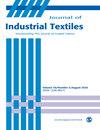Moisture insensitive analysis of polyester/viscose waste textiles using Near-Infrared spectroscopy and Orthogonalization of external parameters algorithm
IF 2
4区 工程技术
Q1 MATERIALS SCIENCE, TEXTILES
引用次数: 0
Abstract
Near-Infrared (NIR) spectroscopic analyses can be applied in waste textile recycling as a rapid and non-invasive method to provide both qualitative and quantitative results. However, it has been a challenge to enhance the accuracy rate of NIR-based waste textile sorting due to the major influences from water contexts in the samples. Orthogonalization of External Parameters (EPO) has been introduced to reduce the interference from water absorption in NIR spectral signals for better accuracy and reliability in modeling. Here we explore the feasibility of applying EPO strategy with varieties of algorithms, including partial least squares regression (PLS), artificial neural network (ANN), decision tree (DT), random forest (RF), gradient boosting decision tree (GBDT), extreme random tree (Extra-tree), decision tree model based on AdaBoost algorithm (AdaBoost-tree), support Vector machine (SVM), one-dimensional convolutional neural network (1D-CNN), and one-dimensional convolutional neural network with improved Inception structure (1D-Inception-CNN). 216 waste textiles samples from Xinjiang, China, were studied with different moisture levels. Among them, 80 samples were used to develop the EPO algorithm, 112 were used to establish the prediction models, and 24 were used as test datasets. Then, the samples were scanned using a near-infrared spectrometer at different moisture regain rates. Our results showed that the moisture content of waste textiles had strong absorption peaks near 1150 and 1450 nm, leading to a decrease in the near-infrared reflectance of waste textiles. To verify the effectiveness of the EPO algorithm, the decision coefficients (R2 score) and other indicators of the model without the EPO process and the model with EPO process are systematically compared. Our results show that the EPO algorithm preprocessing improves the accuracy of the NIR model (The average decision coefficient (R2 score) of the models was increased by 0.83), especially when the moisture interference level is significant. Therefore, the EPO integrated modeling method is a reliable approach for better accuracy in NIR-based waste textile sorting.基于近红外光谱和外参数正交化算法的涤纶/粘胶废纺织品湿不敏感分析
近红外(NIR)光谱分析可以作为一种快速、无创的方法应用于废纺织品回收,提供定性和定量结果。然而,由于样品中水环境的主要影响,提高基于近红外的废纺织品分拣的准确率一直是一个挑战。引入了外部参数正交化(EPO),以减少近红外光谱信号中吸水的干扰,从而提高建模的准确性和可靠性。在这里,我们探索了将EPO策略与各种算法相结合的可行性,包括偏最小二乘回归(PLS)、人工神经网络(ANN)、决策树(DT)、随机森林(RF)、梯度增强决策树(GBDT)、极端随机树(Extra树)、基于AdaBoost算法的决策树模型(AdaBoost-tree)、支持向量机(SVM),一维卷积神经网络(1D-CNN)和具有改进的Inception结构的一维卷积神经网(1D Inception CNN)。对来自中国新疆的216个不同水分水平的废弃纺织品样品进行了研究。其中,80个样本用于开发EPO算法,112个样本用于建立预测模型,24个样本用作测试数据集。然后,使用近红外光谱仪以不同的回潮率对样品进行扫描。我们的结果表明,废纺织品的水分含量在1150和1450 nm附近具有较强的吸收峰,导致废纺织品的近红外反射率降低。为了验证EPO算法的有效性,系统地比较了无EPO过程和有EPO过程的模型的决策系数(R2得分)和其他指标。我们的结果表明,EPO算法预处理提高了NIR模型的准确性(模型的平均决策系数(R2分数)提高了0.83),尤其是当水分干扰水平显著时。因此,EPO集成建模方法是一种可靠的方法,可以在基于近红外的废纺织品分拣中获得更好的精度。
本文章由计算机程序翻译,如有差异,请以英文原文为准。
求助全文
约1分钟内获得全文
求助全文
来源期刊

Journal of Industrial Textiles
MATERIALS SCIENCE, TEXTILES-
CiteScore
5.30
自引率
18.80%
发文量
165
审稿时长
2.3 months
期刊介绍:
The Journal of Industrial Textiles is the only peer reviewed journal devoted exclusively to technology, processing, methodology, modelling and applications in technical textiles, nonwovens, coated and laminated fabrics, textile composites and nanofibers.
 求助内容:
求助内容: 应助结果提醒方式:
应助结果提醒方式:


